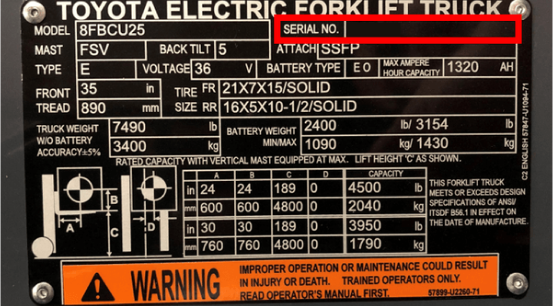How to Find Your Equipment Model Number
Finding the right parts for your equipment is easy when you have your model and serial number which can be found on the data plate. Luckily, a forklift data plate is installed on every truck on the market to help you understand what your forklift can do and provide vital information.
Model Number: The model number of your toyota forklift is extremely important for relaying information to your dealers about repair or technical assistance and for looking up replacements part!
Serial Number: The serial number on your lift is the most important number.The model serial number combination will allow us to provide you with the parts that will fit your particular piece of equipment.

How to Find Your Equipment Serial Number
Finding the right parts for your equipment is easy when you have your model and serial number which can be found on the data plate. Luckily, a forklift data plate is installed on every truck on the market to help you understand what your forklift can do and provide vital information.
Model Number: The model number of your toyota forklift is extremely important for relaying information to your dealers about repair or technical assistance and for looking up replacements part!
Serial Number: The serial number on your lift is the most important number.The model serial number combination will allow us to provide you with the parts that will fit your particular piece of equipment.

Need some help? For further assistance or more information, contact your local Toyota Dealer.

Please click below to sign in to your MyToyota account
Don't have an account?

Where would you like to go?
Do Forklifts Hold Grudges? 3 Reasons Why You Might Have Shorter Electric Forklift Battery Life
?qlt=85&ts=1720629056099&dpr=off)
Electric forklifts are awesome! Electric forklifts are low-emission vehicles that are less maintenance than an internal combustion forklift while maintaining a similar workload as their internal combustion counterpart. This is due to the high-powered forklift battery. With that said, electric forklifts require some unique care that other types of equipment might not require. Failing to take the proper precautions with electric equipment can lead to breakdowns that cost time and money.
3 Reasons your electric forklift may have a shorter battery life
1.High Temperatures’ Impact On Forklift Battery Life
Heat is a battery’s arch-nemesis. Heat from forklift operation causes the lead within the industrial battery to deteriorate. If you use the forklift and battery for an entire shift, make sure you let the battery charge properly and sit long enough to cool down before using it again in the forklift. Also, while you are charging, you will want open the hood to provide proper ventilation. This will help cool the forklift’s battery. Simply, the heat can take years off the battery’s life if not appropriately managed.
2.Over and Under Charging Damages Forklift Battery Life
Your forklift needs a good night’s rest just like the rest of us. If you don’t get enough sleep, you might be frazzled for the day, but if you oversleep, you still might still feel worn out. If you don’t charge the forklift’s battery just right, you risk harming your battery’s lifespan. If you overcharge your forklift battery, you risk excess heat, causing the battery to deteriorate (heat is not your battery’s friend, as we talked about before). You do not want to undercharge your battery either, because undercharging leads to plate sulphation and battery breakdown. Undercharging can drastically shorten the lifespan of the battery.
3.Watering For Increased Forklift Battery Life
Is watering your battery like watering your garden? Well, kind of. Your battery requires watering to provide the appropriate discharge to power your forklift. Lead-acid batteries used in forklifts typically have a mixture of 35% lead acid and 65% water within their cells. You can see that water is very important for powering the battery. During discharge, water evaporates, but the lead acid does not. The evaporation creates disproportionate levels of water and acid. So, you need to replace that water. In this case, you need to water your battery. Easy enough right? Not quite. If the battery is topped up with water at any stage other than fully charged, you risk the battery spilling water and acid on top of the battery and onto the floor. This causes the battery oxidize and lose acid, ultimately losing capacity for operation. Simply put, you only want to water the battery after it has been fully charged.